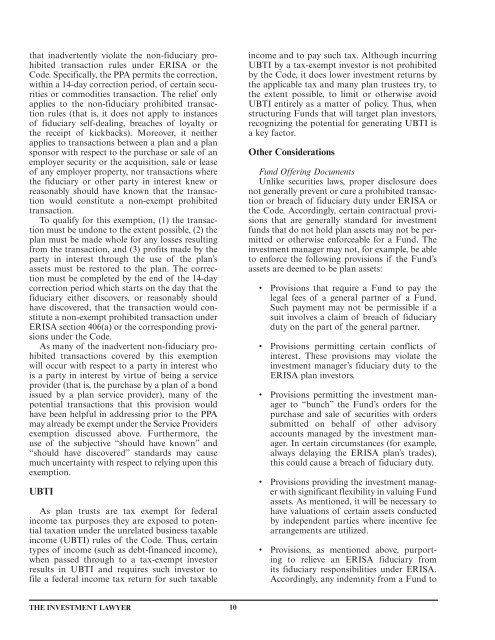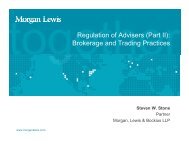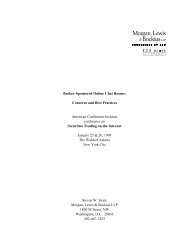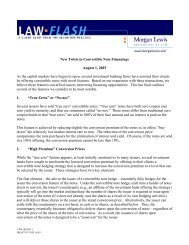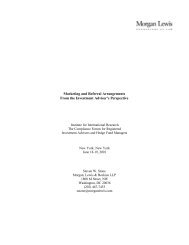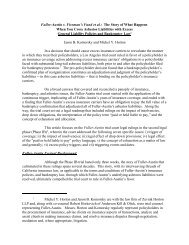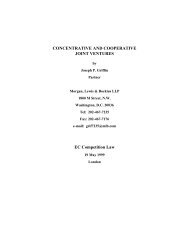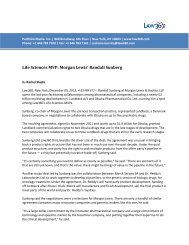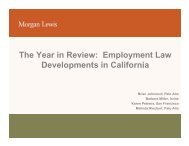What to Do if Your Fund Becomes Subject to ERISA - Morgan, Lewis ...
What to Do if Your Fund Becomes Subject to ERISA - Morgan, Lewis ...
What to Do if Your Fund Becomes Subject to ERISA - Morgan, Lewis ...
Create successful ePaper yourself
Turn your PDF publications into a flip-book with our unique Google optimized e-Paper software.
that inadvertently violate the non-fiduciary prohibited<br />
transaction rules under <strong>ERISA</strong> or the<br />
Code. Spec<strong>if</strong>ically, the PPA permits the correction,<br />
within a 14-day correction period, of certain securities<br />
or commodities transaction. The relief only<br />
applies <strong>to</strong> the non-fiduciary prohibited transaction<br />
rules (that is, it does not apply <strong>to</strong> instances<br />
of fiduciary self-dealing, breaches of loyalty or<br />
the receipt of kickbacks). Moreover, it neither<br />
applies <strong>to</strong> transactions between a plan and a plan<br />
sponsor with respect <strong>to</strong> the purchase or sale of an<br />
employer security or the acquisition, sale or lease<br />
of any employer property, nor transactions where<br />
the fiduciary or other party in interest knew or<br />
reasonably should have known that the transaction<br />
would constitute a non-exempt prohibited<br />
transaction.<br />
To qual<strong>if</strong>y for this exemption, (1) the transaction<br />
must be undone <strong>to</strong> the extent possible, (2) the<br />
plan must be made whole for any losses resulting<br />
from the transaction, and (3) profits made by the<br />
party in interest through the use of the plan’s<br />
assets must be res<strong>to</strong>red <strong>to</strong> the plan. The correction<br />
must be completed by the end of the 14-day<br />
correction period which starts on the day that the<br />
fiduciary either discovers, or reasonably should<br />
have discovered, that the transaction would constitute<br />
a non-exempt prohibited transaction under<br />
<strong>ERISA</strong> section 406(a) or the corresponding provisions<br />
under the Code.<br />
As many of the inadvertent non-fiduciary prohibited<br />
transactions covered by this exemption<br />
will occur with respect <strong>to</strong> a party in interest who<br />
is a party in interest by virtue of being a service<br />
provider (that is, the purchase by a plan of a bond<br />
issued by a plan service provider), many of the<br />
potential transactions that this provision would<br />
have been helpful in addressing prior <strong>to</strong> the PPA<br />
may already be exempt under the Service Providers<br />
exemption discussed above. Furthermore, the<br />
use of the subjective “should have known” and<br />
“should have discovered” standards may cause<br />
much uncertainty with respect <strong>to</strong> relying upon this<br />
exemption.<br />
UBTI<br />
As plan trusts are tax exempt for federal<br />
income tax purposes they are exposed <strong>to</strong> potential<br />
taxation under the unrelated business taxable<br />
income (UBTI) rules of the Code. Thus, certain<br />
types of income (such as debt-financed income),<br />
when passed through <strong>to</strong> a tax-exempt inves<strong>to</strong>r<br />
results in UBTI and requires such inves<strong>to</strong>r <strong>to</strong><br />
file a federal income tax return for such taxable<br />
THE INVESTMENT LAWYER 10<br />
income and <strong>to</strong> pay such tax. Although incurring<br />
UBTI by a tax-exempt inves<strong>to</strong>r is not prohibited<br />
by the Code, it does lower investment returns by<br />
the applicable tax and many plan trustees try, <strong>to</strong><br />
the extent possible, <strong>to</strong> limit or otherwise avoid<br />
UBTI entirely as a matter of policy. Thus, when<br />
structuring <strong>Fund</strong>s that will target plan inves<strong>to</strong>rs,<br />
recognizing the potential for generating UBTI is<br />
a key fac<strong>to</strong>r.<br />
Other Considerations<br />
<strong>Fund</strong> Offering <strong>Do</strong>cuments<br />
Unlike securities laws, proper disclosure does<br />
not generally prevent or cure a prohibited transaction<br />
or breach of fiduciary duty under <strong>ERISA</strong> or<br />
the Code. Accordingly, certain contractual provisions<br />
that are generally standard for investment<br />
funds that do not hold plan assets may not be permitted<br />
or otherwise enforceable for a <strong>Fund</strong>. The<br />
investment manager may not, for example, be able<br />
<strong>to</strong> enforce the following provisions <strong>if</strong> the <strong>Fund</strong>’s<br />
assets are deemed <strong>to</strong> be plan assets:<br />
• Provisions that require a <strong>Fund</strong> <strong>to</strong> pay the<br />
legal fees of a general partner of a <strong>Fund</strong>.<br />
Such payment may not be permissible <strong>if</strong> a<br />
suit involves a claim of breach of fiduciary<br />
duty on the part of the general partner.<br />
• Provisions permitting certain conflicts of<br />
interest. These provisions may violate the<br />
investment manager’s fiduciary duty <strong>to</strong> the<br />
<strong>ERISA</strong> plan inves<strong>to</strong>rs.<br />
• Provisions permitting the investment manager<br />
<strong>to</strong> “bunch” the <strong>Fund</strong>’s orders for the<br />
purchase and sale of securities with orders<br />
submitted on behalf of other advisory<br />
accounts managed by the investment manager.<br />
In certain circumstances (for example,<br />
always delaying the <strong>ERISA</strong> plan’s trades),<br />
this could cause a breach of fiduciary duty.<br />
• Provisions providing the investment manager<br />
with sign<strong>if</strong>icant flexibility in valuing <strong>Fund</strong><br />
assets. As mentioned, it will be necessary <strong>to</strong><br />
have valuations of certain assets conducted<br />
by independent parties where incentive fee<br />
arrangements are utilized.<br />
• Provisions, as mentioned above, purporting<br />
<strong>to</strong> relieve an <strong>ERISA</strong> fiduciary from<br />
its fiduciary responsibilities under <strong>ERISA</strong>.<br />
Accordingly, any indemnity from a <strong>Fund</strong> <strong>to</strong>


